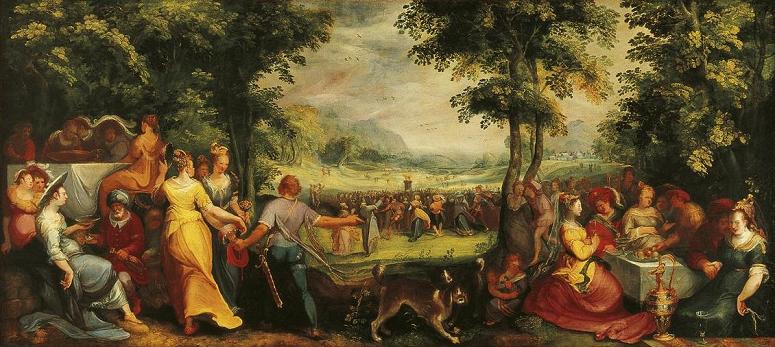Golden Calf. According to the Bible, the golden calf was an idol made by the Israelites when Moses went up to Mount Sinai. It is first mentioned in. Bull worship was common in many cultures. In Egypt, whence according to the Exodus narrative the Hebrews had recently come, the Apis Bull was a comparable object of worship, which some believe the Hebrews were reviving in the wilderness; alternatively, some believe the God of Israel was associated with or pictured as a calf/bull deity through the process of religious assimilation and syncretism. Among the Egyptians' and Hebrews' neighbors in the ancient Near East and in the Aegean, the aurochs, the wild bull, was widely worshipped, often as the Lunar Bull and as the creature of El. When Moses went up into biblical Mount Sinai to receive the Ten Commandments, he left the Israelites for forty days and forty nights. The Israelites feared that he would not return and demanded that Aaron make them gods to go before them. Aaron gathered up the Israelites' golden earrings and ornaments, constructed a molten calf and they declared: These thy gods, O Israel, which brought thee up out of the land of Egypt. Aaron built an altar before the calf and proclaimed the next day to be a feast to the L. So they rose up early the next day and offered burnt-offerings, and brought peace-offerings; and the people sat down to eat and to drink, and rose up to play. God told Moses what the Israelites were up to back in camp, that they had turned aside quickly out of the way which God commanded them and he was going to destroy them and start a new people from Moses. Moses besought and pleaded that they should be spared, and God repented of the evil which He said He would do unto His people. Moses went down from the mountain, but upon seeing the calf, he became angry and threw down the two Tablets of Stone, breaking them. Moses burnt the golden calf in a fire, ground it to powder, scattered it on water, and forced the Israelites to drink it. When Moses asked him, Aaron admitted collecting the gold, and throwing it into the fire, and said it came out as a calf. The Bible records that the tribe of Levi did not worship the golden calf. When Moses stood in the gate of the camp, and said: Whosoever is on the L's side, let him come unto me. And all the sons of Levi gathered themselves together unto him. And he said unto them: Thus saith the L, the God of Israel: Put ye every man his sword upon his thigh, and go to and fro from gate to gate throughout the camp, and slay every man his brother, and every man his companion, and every man his neighbour. And the sons of Levi did according to the word of Moses; and there fell of the people that day about three thousand men. But they, our ancestors, became arrogant and stiff-necked, and they did not obey your commands. They refused to listen and failed to remember the miracles you performed among them. They became stiff-necked and in their rebellion appointed a leader in order to return to their slavery. But you are a forgiving God, gracious and compassionate, slow to anger and abounding in love. Therefore you did not desert them, even when they cast for themselves an image of a calf and said, This is your god, who brought you up out of Egypt, or when they committed awful blasphemies. Because of your great compassion you did not abandon them in the wilderness. By day the pillar of cloud did not fail to guide them on their path, nor the pillar of fire by night to shine on the way they were to take. You gave your good Spirit to instruct them. You did not withhold your manna from their mouths, and you gave them water for their thirst. For forty years you sustained them in the wilderness; they lacked nothing, their clothes did not wear out nor did their feet become swollen. The language suggests that there are some inconsistencies in the other accounts of the Israelites and their use of the calf. As the version in Exodus and 1 Kings are written by Deuteronomistic historians based in the southern Kingdom of Judah, there is a proclivity to expose the Israelites as unfaithful. The inconsistency is primarily located in Exodus 32:4 where gods is plural despite the construction of a single calf. When Ezra retells the story, he uses the single, capitalized God.
more...





